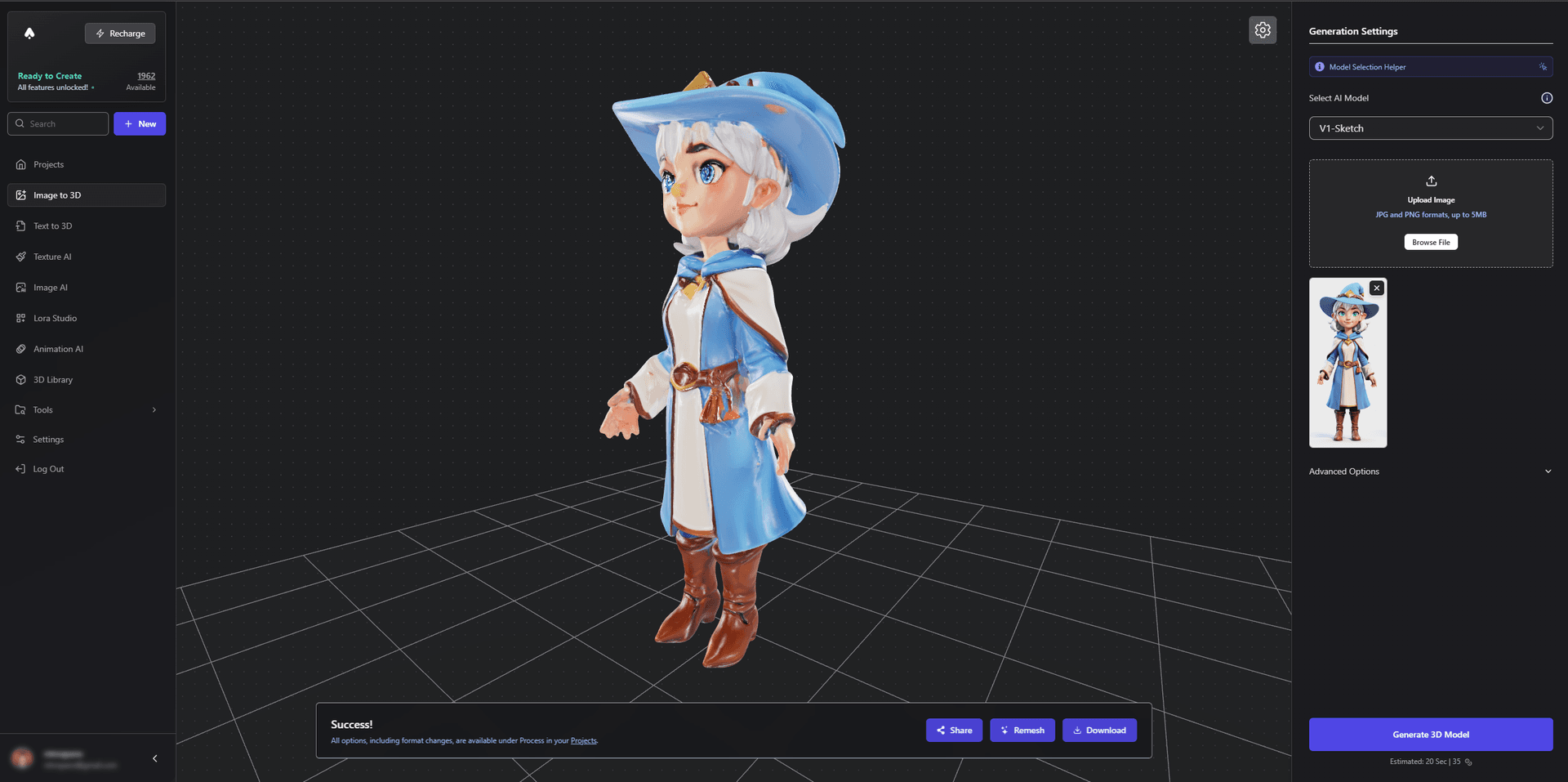Best Tools for Generating 3D Models in 2025: Complete Comparison Guide
The landscape of 3D model generation has transformed dramatically in 2025, with AI-powered tools leading the revolution. This comprehensive guide compares the best solutions available, with a special focus on how these tools can streamline your 3D creation workflow.
Top 3D Generation Tools in 2025
- 3D AI Studio - Complete AI-powered 3D creation suite
- Traditional 3D Modeling Software (Blender, Maya)
- Point Cloud Generation Tools
Let's dive deep into each option, exploring their features, capabilities, and ideal use cases.
3D AI Studio: The Complete Solution
3D AI Studio stands out as the most versatile and powerful option for 3D model generation in 2025. Let's explore its comprehensive feature set:
Text to 3D Generation

Key Features:
- Natural language model generation
- Multiple style options
- Instant results
- Export-ready models
Pro Tip: Use detailed prompts for better results. For example, instead of "knight," try "medieval knight with ornate plate armor, holding a broadsword, battle-ready pose."
Image to 3D Conversion

Capabilities:
- Convert any image to 3D
- Multiple conversion styles
- Automatic UV mapping
- Texture preservation
Advanced Texture Generation

Features:
- AI-powered texture creation
- PBR material generation
- Automatic UV unwrapping
- Style transfer options
Custom Style Training

Benefits:
- Train custom art styles
- Consistent asset generation
- Style transfer capabilities
- Brand consistency
Game-Ready Asset Creation

Perfect for:
- Game development
- AR/VR applications
- Real-time rendering
- Mobile applications
Advanced Features Breakdown
Model Enhancement
The 3D Model Remesher offers:
- Automatic topology optimization
- LOD generation
- UV optimization
- Export format conversion
Animation Ready

Built-in animation capabilities:
- Automatic rigging
- Animation presets
- Custom animation creation
- Motion capture support
Community and Sharing

Social features:
- Asset sharing
- Community challenges
- Collaboration tools
- Resource library
Workflow Comparison
Traditional Workflow (3-5 days):
- Concept sketching (4-8 hours)
- Base modeling (8-16 hours)
- UV unwrapping (4-8 hours)
- Texturing (8-16 hours)
- Optimization (4-8 hours)
3D AI Studio Workflow (15-30 minutes):
- Prompt writing (2-5 minutes)
- Model generation (5-10 minutes)
- Refinements (5-10 minutes)
- Export (2-5 minutes)
Technical Specifications
Model Output Options:
- Formats: GLB, FBX, OBJ, USD
- Polygon count: Adjustable up to 100k
- UV maps: Automatic generation
- Textures: Up to 4K resolution
Performance Metrics:
- Generation time: 30 seconds to 2 minutes
- File size: Optimized for different platforms
- Real-time performance: Optimized for gaming
- Memory usage: Efficient resource management
Industry-Specific Solutions
Game Development:
- Low-poly optimization
- LOD generation
- PBR materials
- Animation ready
Architecture Visualization:
- Accurate scale
- Material presets
- Environmental integration
- Lighting optimization
Product Design:
- Precise measurements
- Manufacturing specs
- Material simulation
- Assembly visualization
Cost Comparison (Annual)
Traditional Software:
- Modeling software: $600-2000
- Texturing tools: $300-900
- Plugins: $200-500
- Training: $1000+
3D AI Studio:
- All-inclusive solution
- Continuous updates
- No additional plugins needed
- Free training resources
Future Developments
Upcoming Features:
- Advanced style training
- Real-time collaboration
- Enhanced animation systems
- Expanded material library
Conclusion
While traditional 3D modeling tools remain valuable for specific use cases, 3D AI Studio represents the future of 3D model generation. Its combination of speed, quality, and ease of use makes it the standout choice for 2025 and beyond.
Ready to transform your 3D modeling workflow? Visit 3D AI Studio today and join the thousands of creators already using AI to revolutionize their 3D creation process.
For more advanced techniques and tips, check out our guide on improving AI-generated models.